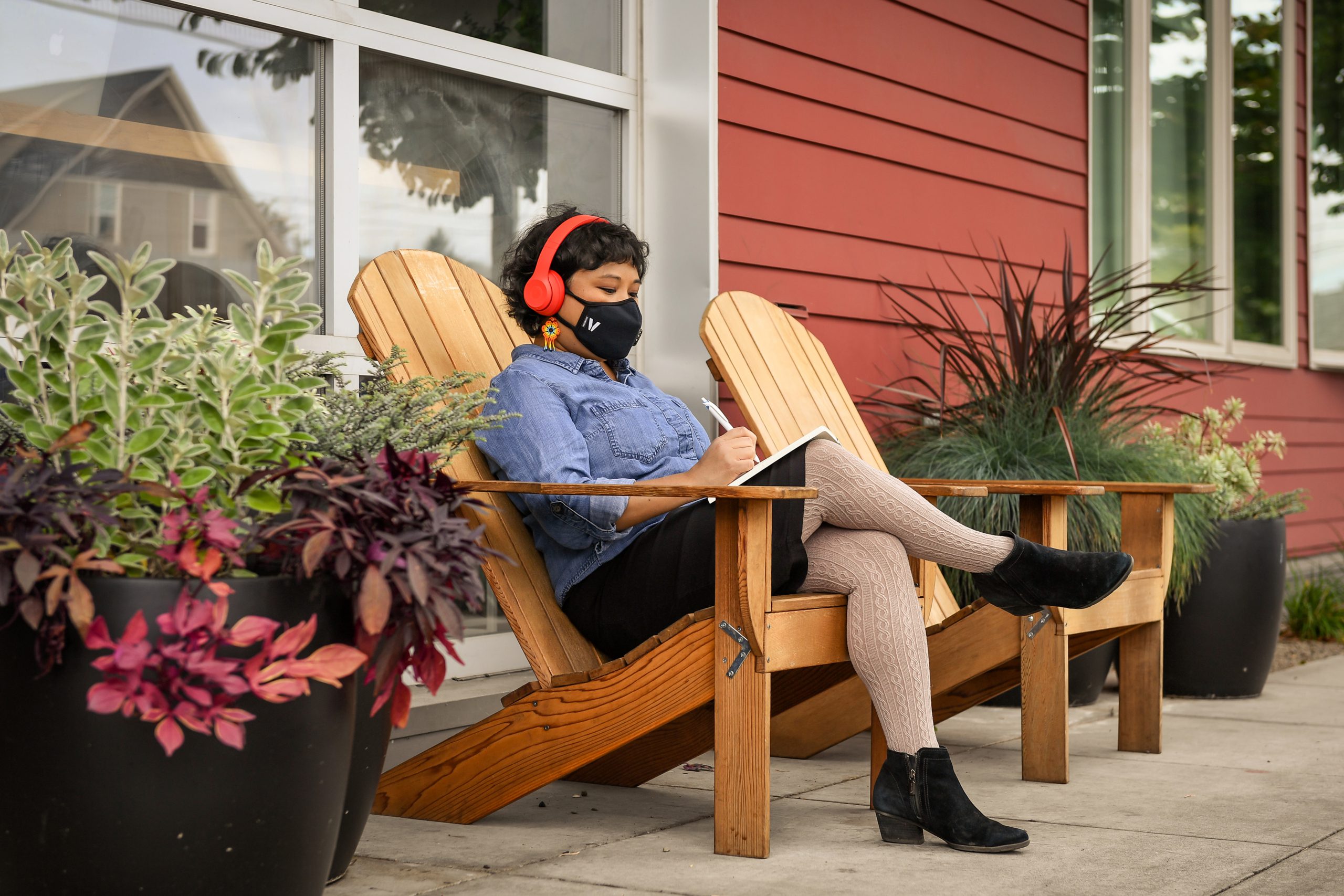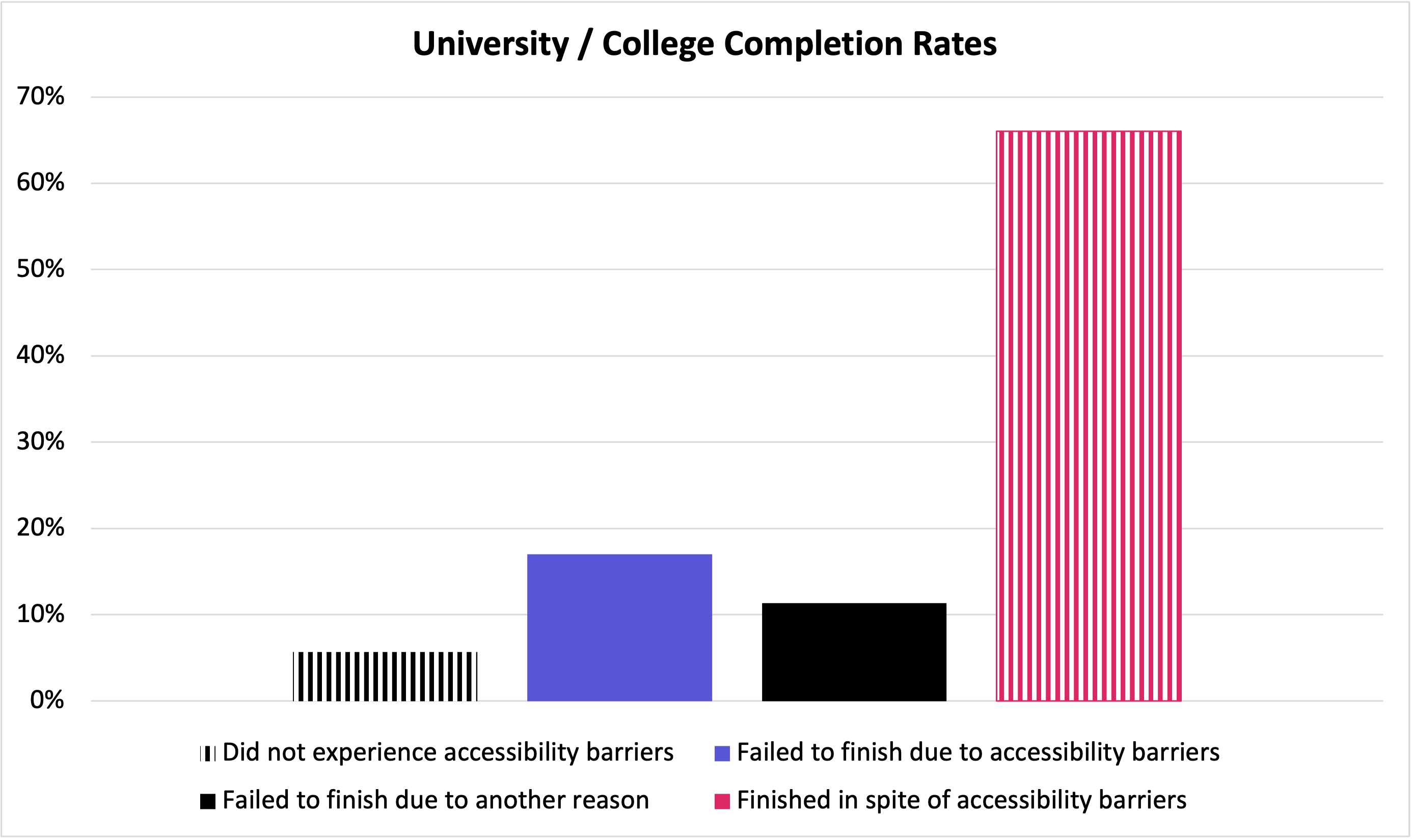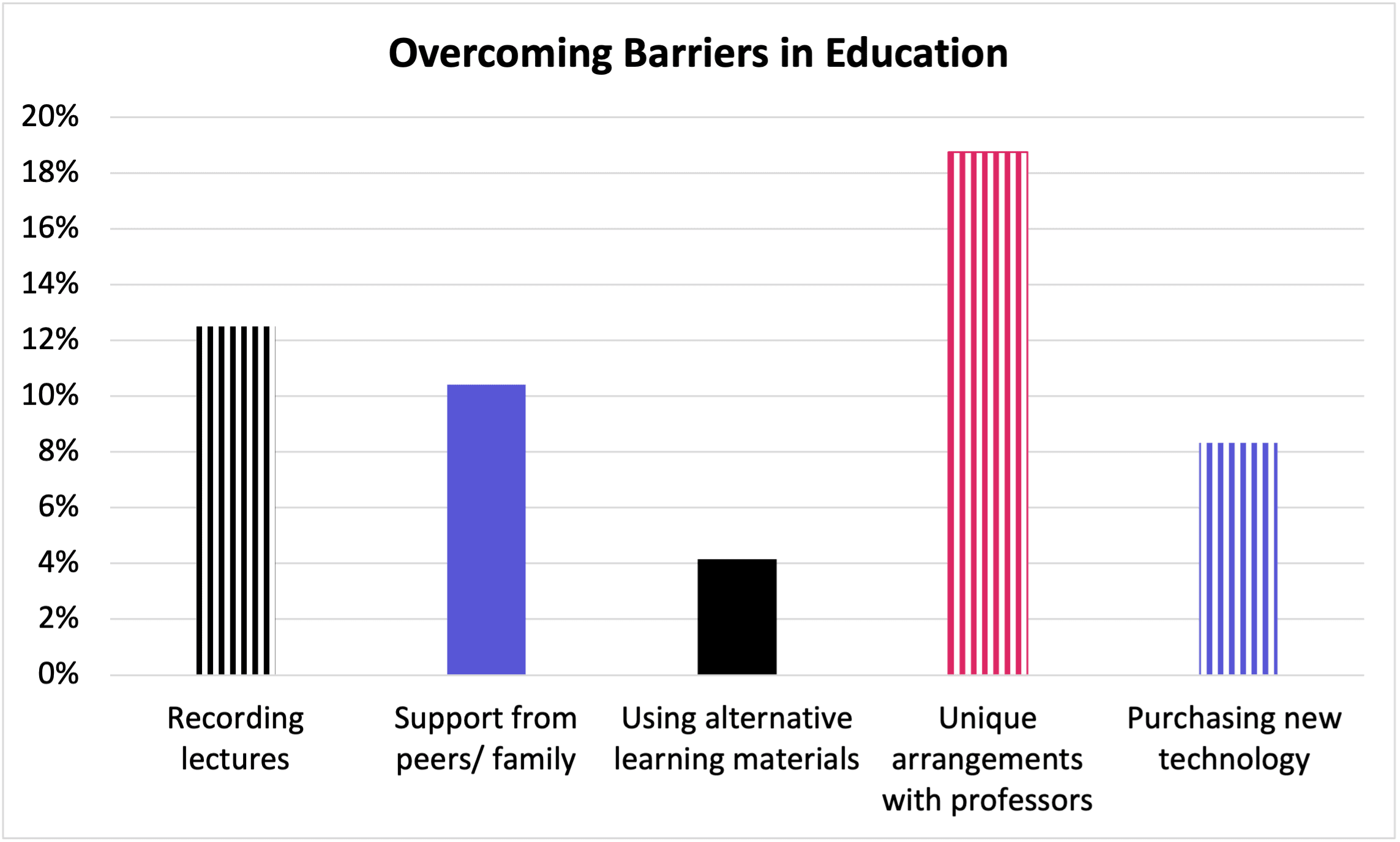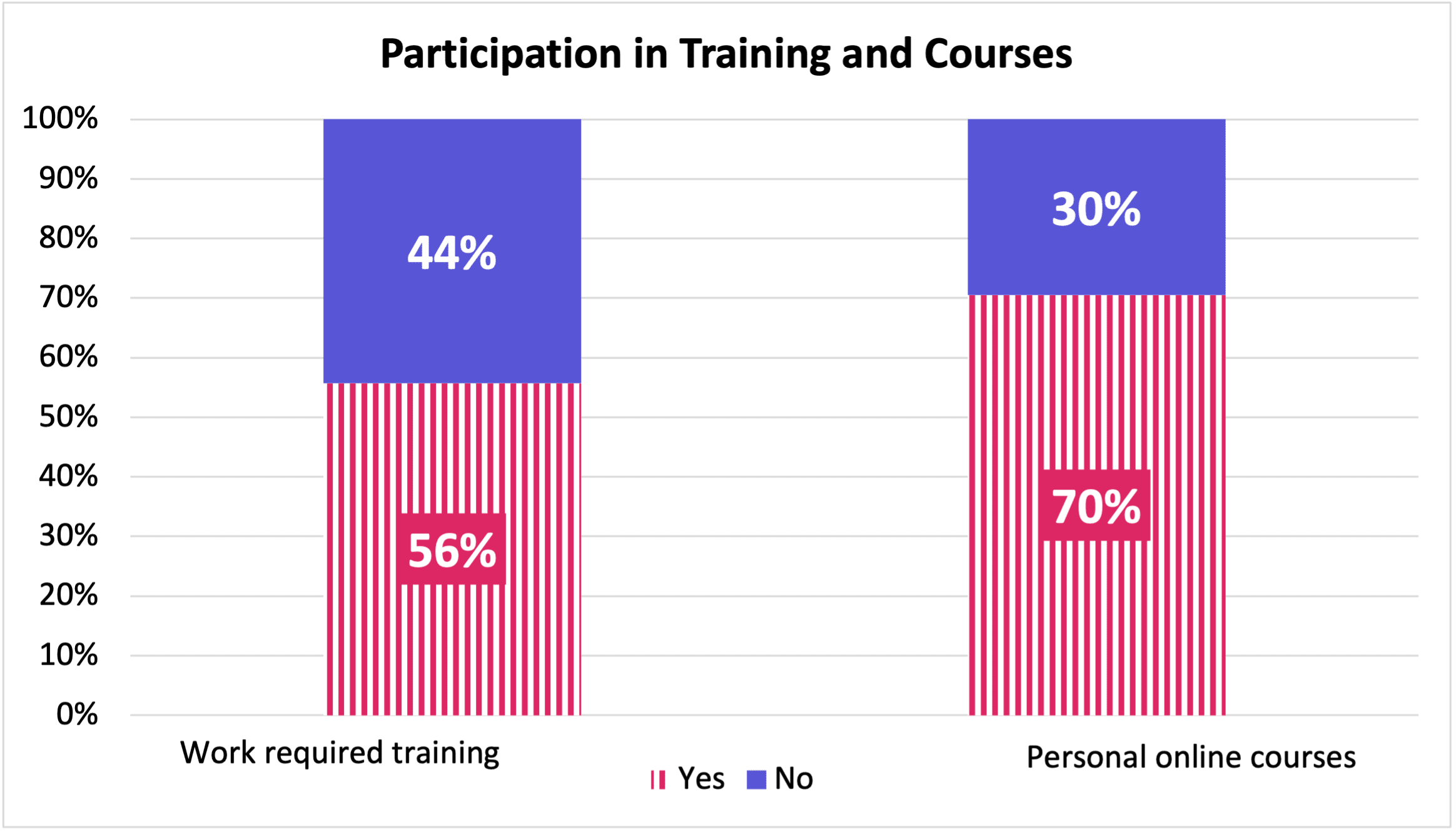Disability and education: a community perspective
Introduction
A common stereotype is that people with disabilities are less educated due to accessibility barriers. While there is some truth to this statement, the more prevalent narrative is that many people with disabilities achieve high educational attainment in spite of accessibility barriers. That said, success despite limited accessibility is something to be addressed and fixed, not used as an excuse for inaction.
To better understand how accessibility impacts educational access, attainment, and individuals going through the process, Fable surveyed our community of assistive technology users to collect their sentiments and thoughts on this topic.
This article presents some of the qualitative and quantitative data uncovered in the hopes that it will aid educational institutions to better understand accessibility from the perspective of students who need it.

Photo Credit: Disabled and Here
Accessibility offices do not guarantee accessibility
Education is particularly critical for people with disabilities because many career paths are not open to them. For example, someone with vision or mobility issues will not be a fit for working in construction or in a kitchen. As a result, people with disabilities almost always need to look toward tech and computer-based work, which typically requires a higher level of formal education than other career paths.
Many traditional educational institutions have accessibility offices that are intended to provide accommodation to any student who needs it. However, the lived experience of Fable’s community suggests that accessibility offices do not provide all the accommodation one may need. Further, community members indicate a concern that many accessibility officers in universities or colleges do not understand all types of disability, meaning they inadvertently discriminate against those who need the most assistance.
Some of the resources and data websites that I needed to visit regularly were not fully accessible. The accessibility office team were not familiar with my needs. I expected them to be more educated in students with a disability and special needs. – Sam N.
I mostly experienced delays in receiving books in alternate formats, and sometimes not receiving them at all. Other times issues came up that involved me being unable to read PowerPoint slides or illustrations presented in class, or not being able to understand video clips that were presented. I overcame all of the above barriers by doing my own research and finding other more accessible materials that would still allow me to learn the same material and concepts. – Charmaine C.
Despite these barriers though, most people (66%) who attended college or university say they completed their degrees despite accessibility barriers. Only a small minority (5.6%) say they did not face accessibility barriers.

While people finishing education despite barriers is heartening, many members indicated they had to self-advocate, sometimes aggressively. This happened even in instances where there was a disability or accessibility office at the school.
During my first attempt at college, I encountered a great deal of prejudice from the head of the Disability Services office. She withheld housing from me, wouldn’t give me a waiver for the physical education requirement, and told me I didn’t belong there. My neuromuscular disease worsened due to all the stress until I had to drop out. A few years ago I applied again, and though I require more accommodations than ever I’ve only had a few problems getting them. – Michelle B.
Forced self-advocacy is an additional burden
While self-advocacy is an important skill, it’s also a burden when you are forced to self-advocate for every needed accommodation. Regardless of whether someone completed or did not complete formal education, people indicated that constant self-advocacy was exhausting and demeaning to them as people.
A lot of my struggles in college was all the required reading. Because I am “only visually impaired”, I did not get a reader and there was so much reading that it was a strain. I tried to record the class. While that helped, it was also a big pain to have to go through parts of lectures again because of not having access to the same information. I had to spend so much more time than my peers and that was incredibly frustrating. – Carrie M.
Some people took educational matters into their own hands, such as recording lectures by themselves to avoid needing to go to the accessibility office. While this meant they were able to avoid prejudice, they ended up with significant additional work to understand the core concepts that other classmates were learning quickly.
There are so many activities that are designed for visual learners and hard for us to participate [in] fully without an assistant. Some platforms such as launchpad etc. [are] not fully accessible with the screen readers also, as I mentioned they are designed for sighted students and their learning style.
– Sam N.

Unfortunately for some, constant self-advocacy painted a grim picture of their future in education, causing them to give up entirely.
I was for that year able to overcome the barriers, but my long-term outlook had me give up. I took many volunteering opportunities that had all my accessibility needs pretty much looked after, and I very much stayed active and engaged in my community. I still question even at this age, and formal education would be rewarding for me. – Adam C.
People with disabilities want to be educated, but still face barriers
In all careers, ongoing education is important. Not only does ongoing education help people build new skills to progress in their careers, but it’s also about keeping up with the pace of change inside of their jobs. Regardless of current achievement or accessibility barriers of the past, people want to continue their education. Over half (55%) have started additional learning due to work requirements. Of those who started additional coursework due to work requirements, almost all (94%) completed the courses with or without accessibility barriers. Outside of work, 73.7% have taken online courses for various personal or career gains.

While there are still barriers at play in education, many people say that online education has changed the game for them.
I don’t even know what I would face if I had to attend on site; I’m glad I can just attend online. I don’t have to worry about winter travelling or my guide dog. It would be nice to be able to pick a flex schedule where I could go to the campus when I needed help. Have some in class days in the nicer seasons. – Jaclyn P.
That said, accessibility still has a long way to go in getting true accessibility for more people.
I would like to mention that sometimes, I feel that screen reader accessibility is such a big focus. It’s true that it’s incredibly important. However, I would appreciate more accessibility, even more than WCAG) for those with severe visual impairments who are not quite using a screen reader yet.
– Carrie M.
It is clear by education completion rates that people with disabilities want education, but they also want educational platforms and employers to know they simply need more time. Or, better yet, they want to see the disability community involved in testing accessible products so they can provide insight on how to make it more efficient for themselves as the end user.
It’s all about receiving alternative formats that are accessible with my screen readers. Sometimes the issue is [a] lack of understanding of the workers. Maybe it takes a bit longer for us to get established in a job, but with some patience, we can work like everybody else and be a good employee if we receive adequate help. – Sam N.
It would be great if institutions had their platforms tested by those with disabilities for accessibility. I have been in a couple of scenarios where I am the first blind person using their online system and they are unaware of how accessible it is. – Michael S.
Conclusion
Disability and education is a difficult topic, so the conversation must continue. However, our community data shows that people with disabilities want education and are willing to work for it. All they ask in return is for educational materials to be made accessible to them.
If you’d like to be part of this conversation, follow Fable on LinkedIn and Twitter. If you’re ready to bring the voices of people with disabilities into your product development and accessibility training processes, book a call with Fable, and we’ll show you how.
